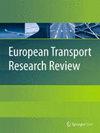Friend or foe? A spatial approach to overlay bicycle and scooter trajectories
IF 4.2
3区 工程技术
Q1 TRANSPORTATION
引用次数: 0
Abstract
Dockless e-scooter schemes have seen increasing popularity in 28 German cities. Increasing use on insufficiently dimensioned bicycle infrastructure can lead to conflicts between e-scooter riders and cyclists. A new approach was developed in order to detect potential zones of conflict by overlaying aggregated bicycle and e-scooter trajectories in the City of Dresden, Germany. Bicycle data is being obtained by the annual STADTRADELN campaign where cyclists record and transmit daily trips via GPS for a period of three weeks. Simultaneously, e-scooter API data has been collected over a course of 8 weeks from June to September 2021. Origin/Destination data has been generated and routed over a OSM network in order to obtain aggregate d e-scooter flows. We extrapolated the aggregated bicycle data to match them with the timeframe of the e-scooter data acquisition. Afterwards we spatially joined both: bicycle and e-scooter flows and calculated the link wise proportion of e-scooter trips in relation to bicycle trip volumes. Two important findings emerged: (1) Residential roads have a higher proportion of e-scooter trips. (2) E-scooters are exposed to high bicycle trip volumes on primary roads with bicycle infrastructure. We conclude that this approach can detect possible links of conflict, where overtaking cyclists or insufficient space can lead to dangerous situations. That approach is biased towards a missing route choice model for e-scooter riders or better route data of e-scooters, which needs further research.朋友还是敌人?叠加自行车和滑板车轨迹的空间方法
无桩电动滑板车计划在德国 28 个城市越来越受欢迎。在尺寸不足的自行车基础设施上越来越多地使用电动滑板车,可能会导致电动滑板车骑行者与自行车骑行者之间发生冲突。我们开发了一种新方法,通过叠加德国德累斯顿市自行车和电动滑板车的总轨迹来检测潜在的冲突区域。自行车数据是通过每年的 STADTRADELN 活动获得的,在该活动中,自行车骑行者通过 GPS 记录并传输每日行程,为期三周。同时,在 2021 年 6 月至 9 月的 8 周时间内,还收集了电动摩托车 API 数据。起点/终点数据通过 OSM 网络生成和路由,以获得电动摩托车的总流量。我们推断了自行车的汇总数据,使其与电动摩托车数据采集的时间范围相匹配。之后,我们将自行车流和电动摩托车流进行空间连接,并计算出电动摩托车出行量占自行车出行量的比例。我们得出了两个重要发现:(1)住宅区道路的电动摩托车出行比例较高。(2)在有自行车基础设施的主干道上,电动滑板车的自行车出行量较高。我们的结论是,这种方法可以发现可能的冲突环节,在这些环节中,自行车超车或空间不足可能导致危险情况。这种方法偏重于缺失的电动滑板车骑行者路线选择模型或更好的电动滑板车路线数据,这需要进一步研究。
本文章由计算机程序翻译,如有差异,请以英文原文为准。
求助全文
约1分钟内获得全文
求助全文
来源期刊

European Transport Research Review
Engineering-Mechanical Engineering
CiteScore
8.60
自引率
4.70%
发文量
49
审稿时长
13 weeks
期刊介绍:
European Transport Research Review (ETRR) is a peer-reviewed open access journal publishing original high-quality scholarly research and developments in areas related to transportation science, technologies, policy and practice. Established in 2008 by the European Conference of Transport Research Institutes (ECTRI), the Journal provides researchers and practitioners around the world with an authoritative forum for the dissemination and critical discussion of new ideas and methodologies that originate in, or are of special interest to, the European transport research community. The journal is unique in its field, as it covers all modes of transport and addresses both the engineering and the social science perspective, offering a truly multidisciplinary platform for researchers, practitioners, engineers and policymakers. ETRR is aimed at a readership including researchers, practitioners in the design and operation of transportation systems, and policymakers at the international, national, regional and local levels.
 求助内容:
求助内容: 应助结果提醒方式:
应助结果提醒方式:


